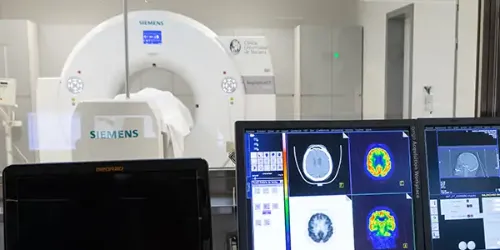Frontotemporal dementia
"Frontotemporal dementias are manifested by a combination of behavioral and/or language symptoms. Patients with frontotemporal dementia are often misdiagnosed as having psychiatric disorders or other neurodegenerative diseases, such as Alzheimer's disease".
DR. ADOLFO JIMÉNEZ HUETE
SPECIALIST. NEUROLOGY DEPARTMENT

Frontotemporal dementia encompasses a group of diseases characterized by the progressive degeneration of the frontal and temporal lobes of the brain.
These regions play a fundamental role in the modulation of personality and behavior, decision making, emotion and language processing.
In people under 60, frontotemporal dementia is the most common cause of dementia and between 45-64 years of age it affects the same number of people as Alzheimer's disease.

What are the symptoms of frontotemporal dementia?
Frontotemporal dementias are manifested by a combination of behavioral and/or language symptoms.
Therefore, it is frequent that patients with frontotemporal dementia are misdiagnosed as having psychiatric disorders (depression, obsessive-compulsive disorder or schizophrenia) or other more frequent dementias, such as Alzheimer's disease or vascular dementia.
The most common symptoms:
- Affection of the personality.
- Affectation of the behavior.
- Affectation of the language.
Do you have any of these symptoms?
You may have frontotemporal dementia
Types of Frontotemporal Dementia
Depending on the predominant symptoms, two main groups can be distinguished:
1. Frontotemporal variant behavioural dementia, in which behavioural alterations predominate. Personality changes, inappropriate public behavior, impulsivity, apathy, loss of empathy, repetitive or compulsive behaviors, and dietary changes are typical.
2. Primary progressive aphasias, in which language alterations predominate. They are characterized by problems in expressing themselves, reading or writing. Memory, however, is usually preserved.
A small percentage of patients may develop symptoms of motor neuron disease (called frontotemporal dementia with amyotrophic lateral sclerosis) or parkinsonian symptoms.
Regardless of the form of presentation, eventually there is a deterioration in the person's daily functioning, which becomes increasingly dependent on carrying out day-to-day activities.
The rate of progression and duration of the disease is very variable, and is greatly influenced by the form of frontotemporal dementia that is suffered.
How is frontotemporal dementia diagnosed?

The diagnosis of frontotemporal dementia is based on clinical data and the results of neurological and neuropsychological examination.
There are tests that allow increasing the diagnostic certainty, such as magnetic resonance and PET-FDG. In certain cases (early onset and with a family history) the genetic study may be indicated.
The evaluation by expert professionals is fundamental to guide the diagnosis, especially in initial phases, in which the first symptoms can be confused with psychiatric illnesses or other neurodegenerative illnesses, such as Alzheimer's disease.
How is frontotemporal dementia treated?
As of today, there are no curative treatments. However, there are certain medications and lifestyle changes that can improve the symptoms and quality of life for patients and caregivers.
Cognitive stimulation is also a useful tool to combat some of the deficits caused by the disease, by empowering areas and capacities that remain preserved and can support those that are more deteriorated.
Where do we treat it?
IN NAVARRE AND MADRID
The Department of Neurology
of the Clínica Universidad de Navarra
The Neurology Department has extensive experience in the diagnosis and multidisciplinary treatment of neurological diseases.
We offer a diagnosis in less than 72 hours, along with a proposal for personalized treatment and post-consultation follow-up of the patient by our specialized nursing team.
We have the most advanced technology for an accurate diagnosis with cutting-edge equipment such as HIFU, deep brain stimulation devices, video EEG, PET and epilepsy surgery, among others.

Why at the Clinica?
- State-of-the-art diagnostic assistance with great work in research and teaching.
- Specialized nursing team.
- We work together with the Sleep Unit.


















